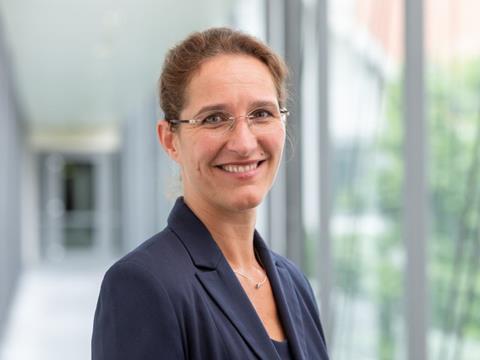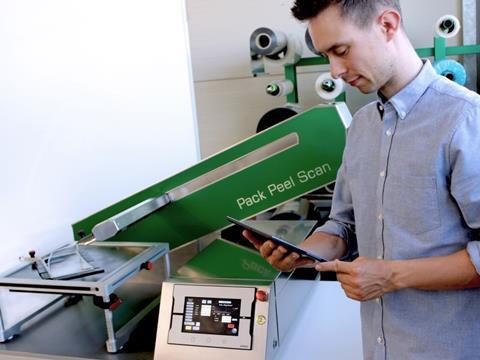
In times where packaging challenges are becoming ever more complex, a cooperative, multi-faceted approach to finding new solutions is emerging as a promising way forward. Prof. Dr Andrea Büttner, the recently appointed director of Fraunhofer Institute for Process Engineering and Packaging IVV, talks to us about her out of the box approach to the issue.
Fraunhofer IVV, located in Freising in Germany, is a research institute that works in the field of food, packaging, processing machinery, product performance, recycling and the environment. The institute describes its main activities as transferring research into practical applications, and it is active in the development of new, alternative raw materials and manufacturing and production processes to minimise the use of energy and resources. Another focus is the safeguarding, analysis, and optimization of the sensory, techno-functional and biological-chemical qualities of products along the process chain, from the raw materials to the final products.
Joined-up thinking
Dr Büttner describes herself as a ‘pathological networker’, and is looking forward to bringing together different disciplines and industry partners.
"This is very dear to my heart. I'm a trained food chemist, a very interdisciplinary subject, as it deals not just with food chemistry, but also biology and microbiology of foods, as well as packaging materials and consumer goods that people deal with on a daily basis. This gives me a wide view on food technology procedures, technologies and laws. I enjoy bringing everything together. Fraunhofer IVV, with its food and packaging focus, is the perfect place for this."
She emphasises that it is almost impossible to look at the issues concerning food and packaging in isolation.
"Fraunhofer IVV research starts at the beginning, from raw materials to processing steps to the final product and beyond. Researchers think about what happens during distribution and retail and how the consumer stores the product at home. Of course, closing the loop is an important topic. These are very complex questions that interlink."
Questioning the status quo
The big packaging sustainability debate circles around the topic of plastic waste, the carbon footprint and food waste. The subject is multi-faceted, and addressing one issue can come at the cost of causing a problem elsewhere. In order to avoid this, Dr Büttner calls for a radical shake-up of how packaging is designed.
"We need different packaging concepts for different types of foods, tailor-made for the respective products and their life cycles, storage duration and distribution channels. We have to critically reflect and question products that have been developed over time. It is a particular challenge to look at individual cases, products and life cycles and question solutions that were developed in the past."
Packaging does not only have the purpose of protecting food, but has many other functions, such as working as an advertising medium to attract attention on the shelf. Dr Büttner thinks questioning this approach is as a good starting point for more sustainable packaging. "How much advertising messaging, how much of a sales incentive actually needs to go into the packaging? How about not putting so much into the presentation of the product? Decorative elements such as colours, prints etc. attract the consumer, but cause major challenges for example when it comes to recycling."
She explains that ideally, a pack would be designed for a specific product in a proactive way, taking into account distribution, presentation and storage in the consumer's home. "The supermarket of the future will likely look completely different. Will there be different pack forms, tailor made individual solutions for individual customers? We live in times where a lot is happening with regards to decentralised diagnostics and monitoring, also in the context of digitalisation and decentralisation. There will be new strategies to monitor quality across different steps, maybe even when the product is at the consumer's house, and damage will be recognised more quickly. This is also an important topic for me with regards to proactive consumer and food protection.”
The waste collection challenge
Dr Büttner goes on to highlight waste collection for recycling as an area that may need some extra thought.
"How are materials collected, and how can they be introduced into a closed loop? How can we make consumers motivated and well-informed, so they make an effort to pre-sort waste?"
She sees education and giving higher acceptance and value to packaging as key. “Currently consumers perceive packaging often as bad and evil. It is important that consumers see that packaging is a valuable material that is worth taking care of. It is our duty at Fraunhofer IVV to educate the public."
Sealing challenges

Fraunhofer IVV works on a wide range of projects, and Dr Büttner highlights one that addresses some of the challenges of packaging materials that contain recycled materials. The institute recently developed a sensor based sealing tool for inline process controls for packaging machines.
"When sealing processes take place in packaging, especially those packs containing a higher percentage of recyclate, strict checks are necessary. The tool enables the user to filter out packs that haven't been sealed to a high standard directly in the machine."
But the use of recyclates also bring technological challenges as they may work differently on packaging machines.
"How can trays and films with recyclate be processed? New technologies working well with the new materials are needed. There are different solution approaches and technological advances, but we have not managed to bring all of this together as a compact or combined solution. Achieving this is an exciting challenge I'm very much looking forward to working on," Dr Büttner says.
“With recycled materials, decontamination can be a major challenge. With the current collection methods and processes, there are many sources that enable contaminations to enter the recycling streams, which have to be eliminated with great effort."
Fraunhofer IVV is active in the area of developing diagnostic tools and sensor systems that recognise deviations from the norms in materials, a challenging field, as Dr Büttner explains.
“Sometimes certain recurring contamination types are known. These can be addressed with targeted sensors, analytical and diagnostic tools, but sometimes contaminations do not fit the brief. This is where intelligent sensor systems are needed – most likely combinations of sensors – and checks need to take place whether a new material is fit to use in packaging or not."
A smelly problem
Seemingly simple problems such as smell can cause a challenge, as Dr Büttner explains.
“Plastics are used to package food, as well as products with strong smells, such as washing powders. Lots of different odours seep into the plastics – getting rid of those smells is a major challenge. This leads to the question: Should we pre-sort certain types of packaging, or design them differently in the first place? The scent doesn't necessarily have to be added into the washing powder and then be flushed away down the drain. Maybe there is a different way of achieving the same result."
Design for recycling
Finding solutions for the issue of recyclability and keeping food safe is another pressing issue.
“For years, companies have worked with multilayer models in order to achieve perfect barrier properties, but at times these are not easily recyclable. With a view to recycling, we need to develop new concepts, such as multilayer products that can be delaminated."
Dr Büttner sees a complementary role for chemical recycling. "With current collection methods and the way packs are designed I see no way around the use of chemical recycling, simply for decontamination reasons. But in some cases, mechanical recycling can work just as well. Recycling for PET bottles, for example, has been very successful as a closed system. Ideal might be, in any case, combinations of sorting and purification technologies…guided by intelligent monitoring and control."
Keeping food safe should remain a key factor, as Dr Büttner points out in conclusion.
"I see a danger that this very strong desire, also in politics, to want a lot really quickly leads to hastily put-together pseudo solutions that end up making the whole issue a lot more difficult, for example when hastily jumping into bio-based and renewable raw material applications that have not undergone a thorough quality check. It is important to keep an eye on functionality and safety. If they create more food waste, then nothing is gained."














